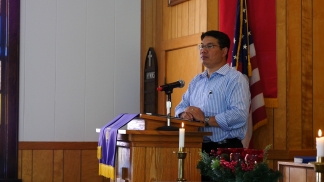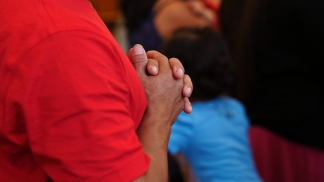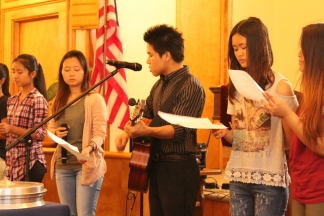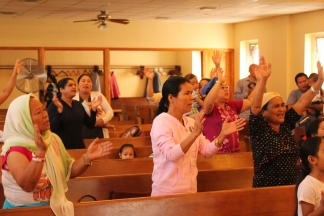news article
Turning refugee “basement churches” into thriving congregations
November 27, 2017 / By Shannon Hodson / .(JavaScript must be enabled to view this email address)
Editor’s Note: This article originally appeared in the Fall 2017 issue of the Advocate, which featured stories that showcased the theme of “Being God’s love to our neighbors in all places.”
Onondaga County welcomes many refugees each year; for example, in 2014, Onondaga County had the third largest intake of refugees in the country. Many of these refugees settle in Syracuse’s North Side; in fact, there are refugees from over two dozen countries living in this neighborhood where Butternut and Lodi Street intersect.
Three of the predominant Asian countries that refugees living in Syracuse’s North Side include: Nepal, Burma, and Bhutan. How do refugees find a community of faith when they come to Syracuse?
Meet Pastor Sonexay (Sean) Chanthasone; he is a local pastor at Lao Westover UMC in Binghamton, NY, and a new church starter at Karenni Good News and New Hope UMC in Syracuse. Sean’s passion for the Lord and commitment to following a calling to be a disciple of Jesus Christ has resulted in two vibrant church communities for refugees from Syracuse’s North Side; one that is Nepalese and one that is Karenni.
Pastor Sean’s personal story and the story of his outreach efforts beautifully showcase what can be accomplished by being God’s love with our neighbors.
Pastor Sean was born in Laos; his family were Buddhist and part of the Ancestor Spirit Faith. When Laos became Communist after the Vietnam War, Sean and his family became separated, and at the age of 15 or 16, Sean moved in with his uncle.
The hardship in Vietnam prompted Sean and one of his friends to try to escape one evening by swimming across the Mekong river, which borders Thailand. He didn’t know he needed legal documents to enter Thailand; the Thailand Police arrested Sean and his friend, imprisoning them for six months, and then they were transferred to a refugee camp that held refugees from Vietnam, Laos, and Cambodia.
Sean said, “The refugee camp is where I found Jesus Christ. I became good friends with a missionary from the United States; he helped me and introduced Jesus Christ to me.
I grew up with Buddhism and the Ancestor Spirit, but I didn’t understand it, whereas Jesus Christ developed peace in my heart. I felt, this is the God I have been looking for.”
Sean started feeling as though the Holy Spirit was working through him. He prayed for a way out of the refugee camp. Sean said, “The conditions of the refugee camps are very bad; you’re always looking for food, you have to protect yourself and develop safety; it’s like a prison for many people. I was there for six years. I asked God for an open door and in April 1987, God answered my prayer.”
A family in Buffalo, NY sponsored Sean to come live with them. The host father was a pastor. They helped put Sean through school and taught him English.
In 1990, Sean heard a missionary from Vietnam speak and instantly felt a call to be a missionary himself. He wanted to go back to his homeland and introduce everyone he knew to Christ.
He completed high school and then went on to Bible School. Once Sean finished high school he applied to go back to his homeland; he said, “Unfortunately, the door was closed because Christians were not allowed to go back. My vision was stalled…so I thought, ‘What am I going to do?’”
Praying to God about this incessantly, God answered Sean by saying, “Well, if you cannot go back to your homeland, how about starting a mission church in our country?”
And Sean did just that. He started a Lao church in Northeast Georgia. Sean said, “We started with two or three families in a basement apartment. It took us about four years until it became an organized church with about 15 families.”
Sean’s church had a relationship with the Lao church in Johnson City, NY. They did a youth program together. And that is how Sean ended up back in New York State.
Sean met his future wife through the youth program; she was also a youth teacher. She was a United Methodist and her father told Sean that if he were to marry his daughter, he needed to be a United Methodist. Sean gladly accepted.
Soon after Sean moved to Binghamton, the pastor of the Lao church resigned. Sean volunteered to help and became the pastor of the church.
Through this position, Sean met the Rev. Brad Hunt of Andrews: Memorial in Syracuse and developed a close friendship with him. He learned of the New Faith Community that Pastor Brad helped start with the Sudanese population and became inspired to do the same with the Laos who lived in the same neighborhood as the Sudanese in Syracuse’s Northside.
Little did Sean know, that he would be creating New Faith Communities for Karenni and Nepalese people!
Sean said, “Within a year, I packed my stuff and came to Syracuse and camped out in Pastor Brad’s church. I would come to Syracuse from Monday through Saturday for three months doing Evangelism door-to-door in Syracuse’s Northside.”
At the time, Andrews: Memorial would often solicit volunteers to pass out food and clothing to the refugees in Syracuse’s Northside. Sean gladly volunteered and one evening, God literally opened doors for Sean to find Asian Brothers and Sisters in Christ who were already worshipping the Lord. Sean refers to this evening as his doughnut ministry.
Sean said, “One family that I passed out a box of doughnuts to was a man named Tu Law; he told me, ‘I am from Burma and I also speak Thai.’ I immediately became excited and interested because I could speak Thai so we were able to have a conversation and he shared with me how he was looking for someone to help him learn English. I gave him a box of doughnuts and said I’d like to get to know him more and could I come again tomorrow, and he agreed to meet me the next day.”
Sean continued, “That’s how our relationship began…deep in my heart, I felt that the Holy Spirit opened the door for me and that he (Tu Law) would be the key for me to open the door for this new ministry. The Lord was right!”
Sean said, “I found out that he (Tu Law) was a leader in the community and by being bilingual, he could help spread my message…so the Holy Spirit led me to the right house. A month after we met, he introduced me to four or five families that were also Christian and had small groups meeting in their basements.”
One of the individuals that Tu Law introduced Sean to was Par Reh, a 57-year-old man of Karenni descent. The Karenni are a population from a poor, rural section of Burma. Par Reh and his family fled Burma in 1999 and lived in a refugee camp in Thailand. They then moved to the United States in 2009.
Par Reh became a Christian in 2000 and attended a church at the refugee camp. He became a leader in that church. When he moved to Trenton, NJ, he went to an American church. Soon, he moved to Syracuse, NY, on the Northside for medical reasons.
Par Reh’s son, Sai Shwe said, “I believe God’s reason for my dad to move to Syracuse was not because of his health; it was to start his own church to bring people to God.”
Par Reh started his home church with other Karenni families and wanted credibility that he was a rightful Christian leader. This is when Sean entered his life. Sai said, “My dad started going to a local pastor’s school with Sean. He received a certificate and at that point was ready to go forward. He put the certificate all over the walls to show people.”
At that time, more and more Karenni on Syracuse’s Northside were yearning to know Jesus. Sean helped them find a larger place to worship at a church building in Mattydale, and also helped find transportation to get them there. This was the start of the Karenni Good News and New Hope UMC.
Unfortunately, Par Reh passed away in 2014 because of cancer. Sai said, “I wondered, ‘Why did my dad have to pass away before he finished the job he wanted to do?’ A lot of people wanted to follow my dad before he died. So after my dad died, my wife, sister, and I stepped up to lead the church.”
Sai continued, “My dad started out with two to three families; we now have about 70 people attending every Sunday at Karenni Good News and New Hope UMC. I just want to keep moving forward; the Lord created the moon and the stars and the sun; he’s the one I want to work for.”
At a Karenni service, there are several youth and children whose primary language is English. Sean gives the sermon in English and Sai translates in Karenni.
With excellent attendance at the Karenni service, Sai’s focus is now outreach. For example, every Saturday, they have a women’s small group that meet at each other’s homes, and they also have a youth group.
Praemoe Phobya helps lead the Karenni women’s small group. She said, “We have women come to my house or our pastor’s house at 10 a.m. on Saturdays and we help them learn more about God.” Since starting the women’s group last year, Praemoe said that about four additional families have started attending the Karenni church regularly because of their outreach.
Through his door-to-door evangelism, Sean also met Sai’s neighbor Manoj, who was from Nepal, and attended a Nepalese Christian small group who met in basements. Manoj’s Uncle Tara Sunwar and a man referred to as Pastor Phillip lead that group.
In seven months, Sean has helped grow the Nepalese group to nearly 50 people, who meet at 8:30 a.m. every Sunday at the Karenni Good News and New Hope UMC.
As is important in their conservative heritage, the women sit on one side of the congregation and then men sit on the other side.
The Nepalese service centers on jubilant singing and dancing. For example, on a sunny August morning, three women with matching floral dresses, a guy on a hand drum, and another on a drum-set, lead the congregation in song in their native language. Manoj said, “Singing and dancing is how you get close with your Christian family, so you see that a lot in our church services.”
During prayer, the Nepalese are asked to say their individual prayers aloud, much like the Tongsung Kido, a type of Korean prayer which we featured in Volume 9, Issue 2 of the Advocate.
Pastor Sean is confident that both the Karenni and Nepalese church groups will grow.
The Rev Dr. Dave Masland, UNY Conference’s Director of New Faith Communities said, “The Karenni Church is incorporated in New York State…but we have not officially chartered it yet. They are close.”
Pastor Sean is so passionate about his calling to bring more refugees into a relationship with God. He said, “We depend on the Holy Spirit to bring everything together. This is just the beginning of our friendship. We get stronger every year.”